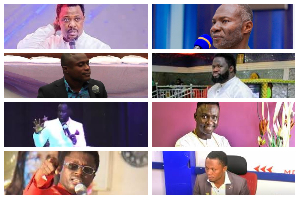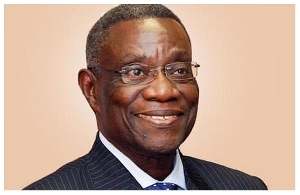All would agree that democracy can only thrive where there are free and fair elections, no compulsion on citizens to vote one way or the other, and the media carries a range of opinions about the elections, including which presidential candidate and representative of political party citizens should vote for.
All this is well and good and central to Ghana’s democratic health.
In early August, Rev. Kusi Boateng, founder of Power Chapel Worldwide, headquartered in Kumasi, caused a stir with a widely reported prophecy.
The National Democratic Congress (NDC) to lose over 19 parliamentary seats with ‘mayhem on the streets’, and the New Patriotic Party’s Dr Mahamudu Bawumia ‘crowned’ president.
Rev. Boateng is not alone in airing God’s revelations about the elections. Several prophets, including the Sierra Leonean, Elijah A. M. Conteh of Revival Power Ministries Worldwide, have claimed that the NDC’s John Mahama will win the presidency following hearing from God on the latter.
The Church of Pentecost, Ghana’s largest, has promised to observe voting in as many areas of the country as possible, to try to ensure that all is peaceful and that there are no attempts at skulduggery, including stuffing ballot boxes with bogus votes.
Clearly, churches can be useful, as with the Church of Pentecost, to help ensure that votes are cast legitimately and, at the end of the process, the will of the people prevails.
This, in a majoritarian democracy such as Ghana’s, is how it works, and is one important reason why the country’s democracy has survived – maybe, not completely thrived – for more than three decades since the inauguration of the Fourth Republic following a decade of undemocratic rule during the Provisional National Defence Council years (1982-1993).
Prophesying electoral outcomes
What however is not appropriate is celebrity preachers prophesying electoral outcomes.
They invariably claim that God has spoken directly to them about the elections and citizens should know what God thinks about the issue. These prophecies have an influence on how citizens vote and they are not appropriate in Ghana’s democracy.
As the Daily Graphic noted in an editorial on February 5, 2024: ‘As the country’s democracy continues to evolve, a phenomenon which has become very disconcerting is fake prophecies and predictions of election results by some charlatans who parade themselves as prophets.’
How is this possible in a democracy such as Ghana’s? First, how do we, the public, know whether God has genuinely spoken to the preachers or do they just make things up to suit themselves and their own personal and political agendas? In other words, how do we identify a fake from the real thing? And what should voters do when they hear such a prophecy?
Should they change their vote as a result of what a pastor says about the elections?
Some celebrity preachers are personally and politically close to one of the main presidential candidates. Are they being objective when they claim God has spoken to them, or are their prophecies sham, issued in a partisan fashion to aid one presidential candidate?
Interviewed by the Daily Graphic in February 2024, Rev. Dr Komi A. Hiagbe, the Rector of the Global Theological Seminary, stated that those prophecies came from persons who wanted the citizenry to believe that God had chosen certain leaders for the country.
The effect of those prophecies on the nation, he believes, is worrying, as certain people claiming to be men of God give contradictory prophecies during elections which may affect the judgement of congregants in making their electoral choices.
Anti-democratic
Rev. Hiagbe is correct, but I would go further than him. I believe that such prophecies are anti-democratic, amounting to an unacceptable intrusion of religion into politics. Lest we forget: Ghana is constitutionally a secular country, where no religion is preferred over another.
Although Ghana is more than 70 per cent Christian, this does not give celebrity preachers the right to air political prophecies as an election approaches as it is democratically dangerous.
They are meddling in politics in an unacceptable manner in a secular democracy. Revs. Boateng and Conteh may be merely airing their personal political preferences.
These may accord with what God has told them; or, it may be that God’s views are unknown to the prophets and their prophecies are not to be trusted or believed.
What is to be done?
If Ghana wants a level playing field for its four-year elections, political prophecies within, say, six months of an election should be banned by law.
It is of course too late for this year’s elections but it could be implemented for 2028. If prophets really do have the ear of God, then perhaps they should ask Him how to improve Ghana’s economy. God knows – pardon the blasphemy – Ghana’s economy is in a parlous state and could do with some heavenly guidance.
The bottom line is that Ghanaians deserve the right to make choices about how to cast their ballots without having to worry about what God thinks about their voting choices.
Opinions of Monday, 12 August 2024
Columnist: Professor Jeffery Haynes















